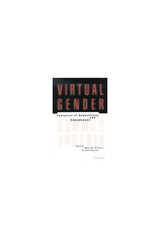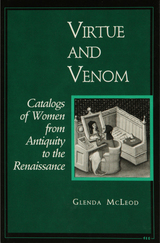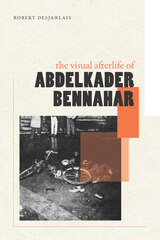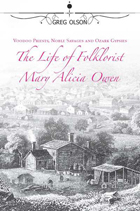3 books about Posten, Anne
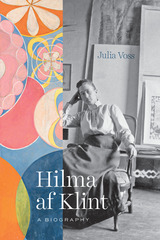
Hilma af Klint
A Biography
Julia Voss
University of Chicago Press, 2022
A highly anticipated biography of the enigmatic and popular Swedish painter.
The Swedish painter Hilma af Klint (1862–1944) was forty-four years old when she broke with the academic tradition in which she had been trained to produce a body of radical, abstract works the likes of which had never been seen before. Today, it is widely accepted that af Klint was one of the earliest abstract academic painters in Europe.
But this is only part of her story. Not only was she a working female artist, she was also an avowed clairvoyant and mystic. Like many of the artists at the turn of the twentieth century who developed some version of abstract painting, af Klint studied Theosophy, which holds that science, art, and religion are all reflections of an underlying life-form that can be harnessed through meditation, study, and experimentation. Well before Kandinsky, Mondrian, and Malevich declared themselves the inventors of abstraction, af Klint was working in a nonrepresentational mode, producing a powerful visual language that continues to speak to audiences today. The exhibition of her work in 2018 at the Guggenheim Museum in New York City attracted more than 600,000 visitors, making it the most-attended show in the history of the institution.
Despite her enormous popularity, there has not yet been a biography of af Klint—until now. Inspired by her first encounter with the artist’s work in 2008, Julia Voss set out to learn Swedish and research af Klint’s life—not only who the artist was but what drove and inspired her. The result is a fascinating biography of an artist who is as great as she is enigmatic.
The Swedish painter Hilma af Klint (1862–1944) was forty-four years old when she broke with the academic tradition in which she had been trained to produce a body of radical, abstract works the likes of which had never been seen before. Today, it is widely accepted that af Klint was one of the earliest abstract academic painters in Europe.
But this is only part of her story. Not only was she a working female artist, she was also an avowed clairvoyant and mystic. Like many of the artists at the turn of the twentieth century who developed some version of abstract painting, af Klint studied Theosophy, which holds that science, art, and religion are all reflections of an underlying life-form that can be harnessed through meditation, study, and experimentation. Well before Kandinsky, Mondrian, and Malevich declared themselves the inventors of abstraction, af Klint was working in a nonrepresentational mode, producing a powerful visual language that continues to speak to audiences today. The exhibition of her work in 2018 at the Guggenheim Museum in New York City attracted more than 600,000 visitors, making it the most-attended show in the history of the institution.
Despite her enormous popularity, there has not yet been a biography of af Klint—until now. Inspired by her first encounter with the artist’s work in 2008, Julia Voss set out to learn Swedish and research af Klint’s life—not only who the artist was but what drove and inspired her. The result is a fascinating biography of an artist who is as great as she is enigmatic.
[more]
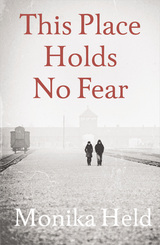
This Place Holds No Fear
Monika Held
Haus Publishing, 2014
Summoned from Vienna to Frankfurt to testify at the Auschwitz trials, Heiner meets Lena, who is working at the court as a translator. During the trial, he describes his experiences of being deported to Auschwitz as a young man. Afterward, the two begin a cautious love affair, but both are unsure whether their feelings will be strong enough to persevere in the shadow of his earlier ordeals. Heiner knows that if they are to stay together, Lena will have to accept the memories of Auschwitz that mark him and build a new life amid the debris of his past.
In this moving novel, Monika Held draws on first-hand reports by Auschwitz survivors to paint an emotive picture of life and love governed by trauma. Throughout, Heiner’s suffering is omnipresent, and Lena’s struggle to hold her own in a relationship dominated by his past is deeply moving. His stories are horrific and disturbing, but they are a part of his identity; he cannot survive without them. And slowly, Lena learns to cherish her own past despite its apparent insignificance.
With its sensitive treatment of two people struggling to confront the Holocaust’s atrocities from very different vantage points, This Place Holds No Fear is a powerful novel of finding love after experiencing unimaginable loss.
In this moving novel, Monika Held draws on first-hand reports by Auschwitz survivors to paint an emotive picture of life and love governed by trauma. Throughout, Heiner’s suffering is omnipresent, and Lena’s struggle to hold her own in a relationship dominated by his past is deeply moving. His stories are horrific and disturbing, but they are a part of his identity; he cannot survive without them. And slowly, Lena learns to cherish her own past despite its apparent insignificance.
With its sensitive treatment of two people struggling to confront the Holocaust’s atrocities from very different vantage points, This Place Holds No Fear is a powerful novel of finding love after experiencing unimaginable loss.
[more]
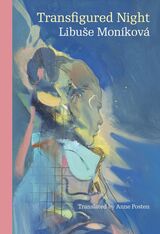
Transfigured Night
Libuše Moníková
Karolinum Press, 2023
A vision of late-twentieth-century Prague from an acclaimed Czech novelist.
In late 1992, three years after the Velvet Revolution and as Czechoslovakia is about to dissolve into the Czech Republic and Slovakia, choreographer and dancer Leonora Marty, who fled the Communist state decades earlier, has returned to Prague. Having wrapped up her ballet of The Makropulos Affair, the famous dancer meets old classmates, wanders the city through crowds of tourists, and visits the most obscure and unvisited museums. When she is approached by Thomas Asperger, a descendant of ethnic Germans driven from Czechoslovakia after World War II, she must confront three relationships—her relationship with the city of her youth, her homeland’s relationship with its past, and her new romance with this German admirer.
Written in German and published in 1995, by an author whose life mirrored her protagonist’s, the novel provides a cultural tour of Prague. Employing a style as influenced by the operas of Leoš Janácek as the novels of Thomas Pynchon, Transfigured Night is a masterpiece of Czech literature, showing that the culture of this nation comes in a variety of tongues.
In late 1992, three years after the Velvet Revolution and as Czechoslovakia is about to dissolve into the Czech Republic and Slovakia, choreographer and dancer Leonora Marty, who fled the Communist state decades earlier, has returned to Prague. Having wrapped up her ballet of The Makropulos Affair, the famous dancer meets old classmates, wanders the city through crowds of tourists, and visits the most obscure and unvisited museums. When she is approached by Thomas Asperger, a descendant of ethnic Germans driven from Czechoslovakia after World War II, she must confront three relationships—her relationship with the city of her youth, her homeland’s relationship with its past, and her new romance with this German admirer.
Written in German and published in 1995, by an author whose life mirrored her protagonist’s, the novel provides a cultural tour of Prague. Employing a style as influenced by the operas of Leoš Janácek as the novels of Thomas Pynchon, Transfigured Night is a masterpiece of Czech literature, showing that the culture of this nation comes in a variety of tongues.
[more]
READERS
Browse our collection.
PUBLISHERS
See BiblioVault's publisher services.
STUDENT SERVICES
Files for college accessibility offices.
UChicago Accessibility Resources
home | accessibility | search | about | contact us
BiblioVault ® 2001 - 2025
The University of Chicago Press


